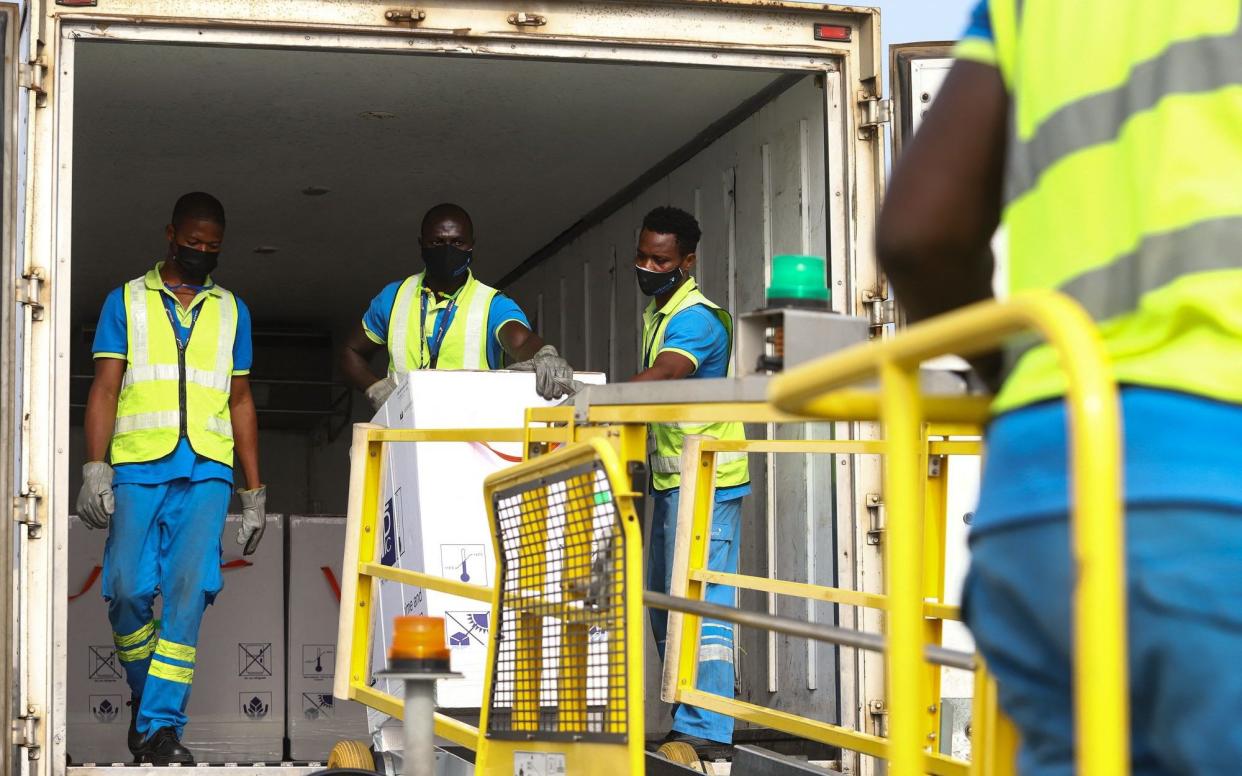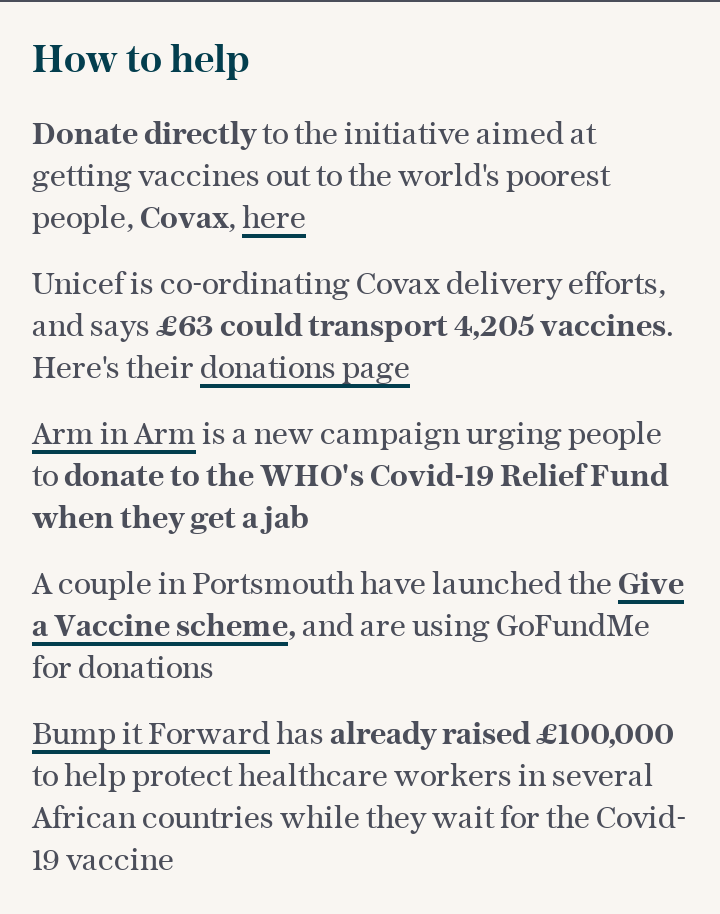First Covax delivery arrives in Ghana in 'momentous moment' for global vaccine roll out

Ghana received the first delivery of coronavirus vaccines through the Covax scheme on Wednesday morning, a major landmark in efforts to accelerate immunisation campaigns in poorer countries.
A flight carrying 600,000 doses of the Oxford-AstraZeneca vaccine produced by the Serum Institute of India landed in Ghana’s capital city, Accra, in the early hours of Wednesday morning.
The vaccines are the first to be distributed in an initial tranche of deliveries to low and middle income countries through Covax, a scheme led by the World Health Organization (WHO), Coalition for Epidemic Preparedness (Cepi) and Gavi, the Vaccine Alliance.
To date just 10 countries have administered roughly 75 per cent of all vaccinations, according to the United Nations secretary general, António Guterres, who labelled global rollout as “wildly uneven and unfair” during the UN security council last week.
The arrival of vaccines in Ghana will offer a glimmer of hope that this disparity may soon be rebalanced.
In a joint statement Dr Francis Kasolo, the WHO representative in Ghana, and Anne-Claire Dufay from Unicef - which is responsible for the logistics of distributing vaccines for Covax - described the delivery as “a momentous occasion”.
#Ghana🇬🇭 becomes the first African country to receive #COVID19 vaccines from the COVAX facility. 600,000 Oxford-AstraZeneca doses arrived in Accra this morning. The delivery is the first wave of arrivals to continue in coming days. pic.twitter.com/1R5mVciEpv
— WHO African Region (@WHOAFRO) February 24, 2021
“The arrival of the Covid-19 vaccines into Ghana is critical in bringing the pandemic to an end,” the pair said. “The shipments also represent the beginning of what should be the largest vaccine procurement and supply operation in history.”
Covax was launched in June 2020 to ensure that low and middle income countries are not excluded from the scramble to secure Covid-19 vaccines. The scheme does not rely on donations from rich nations, having secured deals with manufacturers independently, though there is a mechanism for nations to share surplus doses.
The initiative aims to distribute roughly 2.3 billion doses globally by the end of the year, including 1.8 billion to 92 poorer countries at no cost to their governments. Planning documents estimate that 337 million doses will be delivered by the end of June.
The bulk of the jabs used in this initial phase will be the Oxford-AstraZeneca vaccine, including roughly 240 million from the SII - which signed a licensing agreement with the British pharmaceutical company last year - and 96 million directly from AstraZeneca via a plant in South Korea.
The 600,000 vaccines are the first of 2.4 million Ghana expects to receive via Covax in the next four months. The government said on Friday that the first tranche will be used to kick start the country’s vaccination drive, which prioritises frontline health workers and those most vulnerable to severe disease.
To date, Ghana has reported 80,759 cases and 582. Infections are gradually beginning to fall after a second wave hit the nation in January.
“Vaccines save lives,” said Dr Kasolo and Ms Dufay. “As health workers and other front-line staff are vaccinated, we will be able to gradually see a return to normalcy, including better access to health, education and protection services.”
For many, this initial delivery will be further confirmation that Covax has successfully narrowed the gap between the moment that wealthy and poor nations begin rolling out jabs.
During the 2009 H1N1 swine flu pandemic, the majority of poorer countries waited almost a year for vaccines after rich nations hoovered up global supplies. This time, it is less than three months since the first person was given a vaccine outside of clinical trials; Margaret Keenan was given the Pfizer jab in the UK on December 8.
Many wealthy nations are also only just beginning vaccination drives - Australia launched their immunisation campaign on Monday and Japan began last week - while rollout has been slow in others, most notably Europe, due to supply complications.
Yet the stark disparities in global efforts has still triggered widespread concern. At a press conference on Tuesday Dr Tedros Adhanom Ghebreyesus, director general of the WHO, warned the global distribution of Covid jabs was “in jeopardy”.
“So far 210 million doses of vaccine have been administered globally but half of those are in just two countries; more than 200 countries are yet to administer a single dose,” he said, urging wealthy countries to share currently available supplies.
Dr Tedros added that bilateral deals between rich nationals and vaccine manufacturers have made it more difficult for Covax to acquire jabs, leading Rwanda’s President Paul Kagame to condemn “hypocrisy and double standards” in global distribution efforts.
Ahead of a virtual meeting of the G7 last week, the European Union, Germany and the United States dramatically boosted their donations to Covax, while the UK promised to share surplus vaccines with the scheme at an unspecified point in the future.
Following the delivery to Ghana, Foreign Secretary Dominic Raab added that today's rollout is “a huge step forward in ending this pandemic”.
“As one of the biggest donors to Covax the UK is ensuring that more than one billion vaccine doses will be sent to 92 countries so that no one is left behind in this global fight. We will only save lives and reduce the risk of future infections if we prevent the virus spreading in the world’s developing countries,” he said.
France’s President Emmanuel Macron has also urged the US and Europe to donate five per cent of their current supplies to poorer nations last week - a plea backed on Tuesday by the European Commission President Ursula von der Leyen - to rebalance distribution and diminish the influence of China and Russia.

Both countries have launched major “vaccine diplomacy” efforts to gain soft power and influence in poorer nations.
China has already donated small batches of its Sinopharm vaccine to countries including Zimbabwe and Equatorial Guinea, while Russia has offered to supply 300 million doses of its Sputnik V vaccine to the African Union (AU) scheme along with a financing package.
Amid concerns that Covax alone will not provide the continent with enough jabs to reach herd immunity, the AU has been trying to help its 55 member states buy more doses in a push to immunise 60 per cent of the continent's 1.3 billion people over three years.
Last week, its vaccine team said 270 million doses of AstraZeneca, Pfizer and Johnson & Johnson vaccines secured for delivery this year had been taken up.
Protect yourself and your family by learning more about Global Health Security

